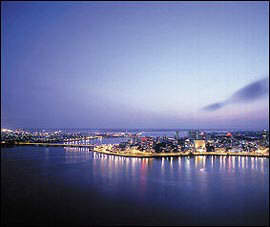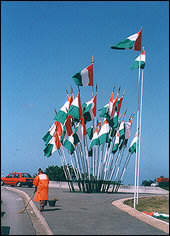 Republic of the Côte d´Ivoire: Reshaping the Nation Republic of the Côte d´Ivoire: Reshaping the Nation |

Côte d'Ivoire, a former French colony is located in West Africa. It shares common boundaries with Burkina Faso and Mali in the North, Liberia and Guinea in the West, and Ghana in the East. With an estimated official population of 15 million, the country is the second largest market after Nigeria, and France's best trading partner in the region.
Since 24 December, 1999 General Robert Guei is Côte d'Ivoire's Head of State following the military take-over hatched by young soldiers who were advocating for better living conditions. He succeeds President Henri Konan Bédié who came to power on 7 December, 1993 on the death of Felix Houphouet Boigny. Today, Côte d'Ivoire is undergoing a transition phase moving a step closer towards the writing of a new constitution and the organization of elections by October 2000 which should ultimately usher the country into the Second Republic.
Côte d'Ivoire became independent on 7 August, 1960 with Felix Houphouet-Boigny coming to power at the same time as President. One of his first goals was to transform Abidjan, the country's capital city, into a modern city modelled after Dakar the former capital of French West Africa long regarded as the most prosperous city in the region.
Mr. Houphouet-Boigny had also wanted his country to play the leading role in West Africa and this was indeed responsible for the country's policy of opening its doors to the outside world.
The country also needed to establish itself in the CFA zone if its convertibility of the currency were to be guaranteed. State-owned companies were largely encouraged since the private sector was weak at the time. That was Houphouet-Boigny's development approach. However, the government's current disengagement policy is part of his program.
Therefore, an entire decade after the country's independence was marked by remarkable and undeniable economic progress, with the average annual economic growth rate for the past decade being 7.7% while the average inflation rate had been a mere 4% of the GNP. The Government's budget thus looked quite positive, (with growth rate at 6% of the GNP). During the same period, investments reached 17.3% of GNP.
Despite of these significant achievements, the following decade (1970-1979) witnessed serious difficulties caused by the sudden increase in oil prices on the international market. Growth rate slumped from 7.7% to 6.1% of GNP. Budget deficit was also considerable (4.7%).

It was not until 1977 that the country experienced a rebirth, with a boost in commodities like coffee and cocoa on the international markets which brought gains to the economy. The Caisse de Stabilisation responsible for controlling and stabilizing prices recorded a profit of about CFA F 20 billion.
The Ivorian government seized the opportunity provided by that boom period to invest massively but running into huge debts at the same time. Total debt which was 9.1% during the first decade, had reached 40.8% by 1977.
Yet another difficult period set-in in 1979. A second increase in oil prices resulted in a serious economic crisis characterised by a fall in world coffee and cocoa prices. The most visible aspect of this crisis was the instability in public finance which made debt-servicing difficult. The economy was clearly unhealthy. The result: existing donors refused to grant debt relief, thus reducing economic support. Several uncompleted projects as well as lack of competition on the international markets and a weakness in production, all made it difficult for the government to experience new growth.
From then on, the country was compelled to turn to other donors and embark on new measures. An austerity program designed to curb public expenditure and increase State revenue was therefore introduced between 1981 and 1993. Aware of the need to attract foreign investors, the government introduced a series of reforms aimed at facilitating and making the establishment of foreign companies in Côte d'Ivoire more attractive. Capital transfer became unrestricted and the foreign companies enjoyed a number of tax privileges.
Despite of all the efforts made by the Ivorian government to restructure its economy in 1981, the country still suffered a financial crisis leading to budget deficits. The same situation prevailed in most West African countries.
This ailing picture was obviously responsible for
a devaluation policy being tested in January 1994
barely one month after the death of President Felix
Houphouet-Boigny. |
In 1990, while President Houphouet-Boigny was still in power, multi-party elections were held where he won with a wide margin. That election in which Houphouet-Boigny won against the opposition leader of the Front Populaire Ivoirien (Ivorian Popular Front) was a turning point in the country's history.
The devaluation in 1994 (of 50% of the CFA Franc) actually marked the beginning of a real take-off of the country's economy. By the end of that year, growth rate was put at 1.7% of GNP. In the same year, public finance deficit dropped from 13.32% to 7.8% of GNP.
In 1995, President Henry Konan Bédié who was National Assembly President before coming to power after the death of Houphouet-Boigny, decided to make Cote d'Ivoire a country more open to the outside world. The disengagement policy of the country became reviewed with the intention of attracting foreign investors.
Between 1991 and 1998, 61 state-owned companies were privatised. Meanwhile the judicial system is undergoing reforms and it is currently in the process of being improved so as to make privatisation more accessible.
From another perspective, the Regional Stock Market in Abidjan, established in 1998, offers tremendous opportunities for Ivorian investors. With the realisation of the country's twelve development projects, its dream of becoming the "Elephant of Africa" is indeed becoming a reality.
The twelve development projects include: the extension and modernisation of the Abidjan international airport, the construction of three bridges, an olympic stadium, an art gallery, an ultra-modern abattoir and the Grand-Bassam super highway. Twenty other projects were launched in 1998, all designed to develop the different parts of the country.
The level of macro economic and sectoral performances of the country helped the economy to bounce back thereby improving the competitiveness of the economy and producing high growth rates. The set objective being the improvement of people's living conditions and the need to consolidate on Côte d'Ivoire's position in the West African economy within the larger framework of UEMOA (West African Monetary Union) and ECOWAS (Economic Community of West African States). This new orientation will enable the government to envisage the construction of schools, universities, hospitals and also the establishment of basic amenities (water, electricity).
The United States is Côte d'Ivoire's third international trading partner with Africa being considered to be a continent where even if the needs are high, so is the return on investment and thus the need to invest now so as to reap the rewards later.
Concerning the issue of attracting foreign capital, President Guei believes that investors who have decided to show a measure of confidence in Côte d'Ivoire should be reassured. " This will become reality through an independent judiciary and anti-corruption actions. We hope to change the mentality of Ivorians ", he said. The new regime intends to conduct management audits on activities of the former President. Accounts of some top officials of the Bédié regime were seized. For the presidential elections next October, General Guei is yet to declare if he will be a candidate or not. "It is the people who will decide. As for me, I have a mission to accomplish ", he states.

As for the former President of the Republic, General Guei, the reasons for overthrowing President Bedie's regime derive from the high social and political tensions prevailing at that period. " Politically, there was an impasse ", declares Robert Guei. In fact, Bédié was categorically opposed to the candidacy of Allasane Dramane Ouattara for the next presidential elections. All this did nothing to foster unity among Ivorians. " This is why the young soldiers, within the framework of the mission they gave me with, requested me to institute reforms in the country's political life at the second stage of the mission ", he confirms. The first stage of the mission being the improvement of soldiers' living conditions. " Concerning the reforms in the country's political life, we are putting in place a vast programme of popular consultation ", the President hinted. Thus, the National Council for Public Salvation created after the military take-over and headed by Robert Guei has announced the date for general elections for 31 October, 2000. A committee responsible for writing a new constitution, compiling voters' lists and organising elections has been newly created. The committee, at the end of its work, will propose the new constitution to the transitional government who will in turn submit it to the people through a referendum. The transitional government includes 24 Ministers drawn from the Front Populaire Ivoirien (Ivorian Popular Front) (FPI), the Rassemblement des Republicains (Rally for Republicans), the military and civil society.
Côte d'Ivoire distinguishes itself by its multi-culturalism because it is made up of about 60 ethnic groups. In addition, a large number of foreigners representing about 33% of the population live in the country. Consequently, Côte d'Ivoire is a land of hospitality and not a xenophobic one. Some years ago now, however, the concept of Ivority was developed.
Up until now, the mainstay of Côte d'Ivoire's economy has been agriculture. This is due to the attention given to this sector by its leaders right from independence. |

